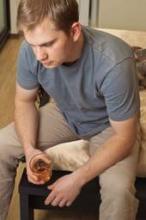Ms. A. arrived at the office for a routine medication visit with her psychiatrist. She was visibly tense and dejected, with swollen eyes from a night of crying. "I am so hurt! My son is so bright – he really has potential – but he’s drinking way too much. He took a leave from college after getting bad grades last semester, and now his girlfriend broke up with him!"
She continued, looking down at the floor. "A few years ago, his father died, and they were so close. Now, it’s just the two of us living in our home, as my daughter is out of state. Anyway, my son has distanced her as well. They aren’t as close as they used to be.
"I want to help him so badly but he doesn’t think he has a problem. He’s not in school, but he won’t even look for a job. I feel responsible ... and ashamed. I can’t even tell my family. What should I do?"
Family-Focused Interventions
Most individuals with substance use disorders resist engaging in treatment despite the negative consequences of their addictions. (NIDA Res. Monogr. 1997;165:44-84). People who misuse substances typically have calamitous effects on their families, who then need to reach out to mental health professionals for advice, support, empathy, and direction – yet family members often do not seek help. In the families of addicts, marital distress, social problems, financial woes, legal problems, criminality, aggression, and interpersonal violence commonly arise (Int. J. Addict. 1992;27:1-14), often leading to feelings of intense anger, sadness, anxiety, shame, guilt, and social isolation (Drugs in the Family: The Impact on Parents and Siblings. University of Glasgow, Scotland, 2005). Providing support to families of addicts is crucial, along with getting the substance abuser into treatment.
Family-focused interventions can lead to positive outcomes for both the substance misuser and his or her family members. Alcoholics Anonymous (families group)/Narcotics Anonymous (families group) are good family-support groups. Family therapy, such as the Behavioral Couples Therapy (BCT) of Fals-Stewart, is very effective. But the question often is: How do I persuade my relative to seek help? Two evidence-based treatments designed to help family members persuade their loved ones to seek treatment are profiled here.
Community Reinforcement Approach Family Training (CRAFT)
CRAFT uses a positive approach that doesn’t involve confrontation. This program encourages family members to identify the addict’s triggers, to assist him in breaking the patterns that lead to his drinking. Once these triggers are identified, CRAFT helps the family learn how to reward nondrinking through positive reinforcement.
Family members learn how to improve their communication skills in order to more effectively express their needs and also to reestablish good self-care. In a recent study, CRAFT resulted in three times more patient engagement than do Al-Anon/Nar-Anon, and two times more patient engagement than does the Johnson Institute Intervention. CRAFT also encouraged two-thirds of treatment-resistant patients to attend treatment (Addiction 2010;105:1729-38).
A Relational Intervention Sequence for Engagement (ARISE)
ARISE engages the patient in a family-centered process. The assumption with ARISE is that families are competent and have the capacity to heal. The therapist looks for strengths within family relationships. An "intervention recovery network" within the family functions like a board of directors, so that the addict cannot manipulate people one-on-one.
The process of ARISE is as follows. First, the telephone call: The therapist coaches the caller to include all the family members and as many friends as possible for the intervention. Next, the "identified loved one," or substance abuser, is invited into a conversation that will occur in the form of a family meeting. By the time of the family meeting, each participant has become clear on their "eyewitness account" of how the crisis has affected their loved one and the whole group.
Ideally, before the family meeting, the family members and friends cooperate to plan and write a "change message" that will be shared with their loved one at the family meeting. At the meeting, the group talks, and then signs the change agreement. The individual with substance abuse/dependence also signs the change plan. The therapist’s goal is to get the substance abuser into treatment. If successful, the therapist then collaborates with the treatment provider, and family and friends, through weekly phone calls for 6 months. In an NIH-funded study, ARISE resulted in 83% of substance abusers entering treatment (Am. J. Drug Alcohol Abuse 2004;30:711-48).
Beyond this overall framework, the ARISE program offers tips and guidance for families, to maximize the odds of success:


